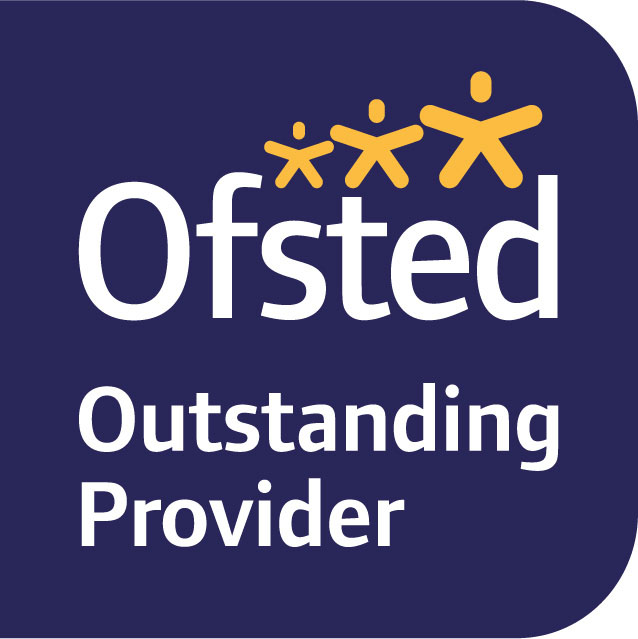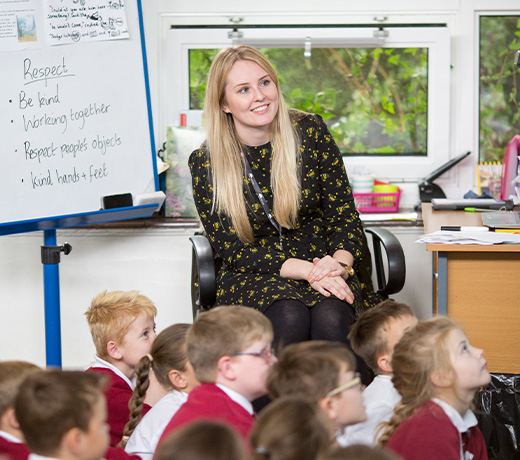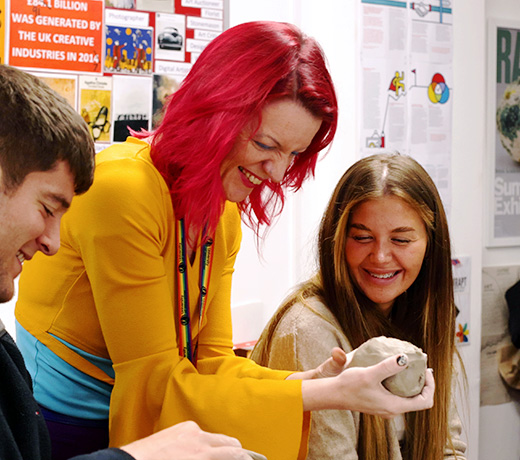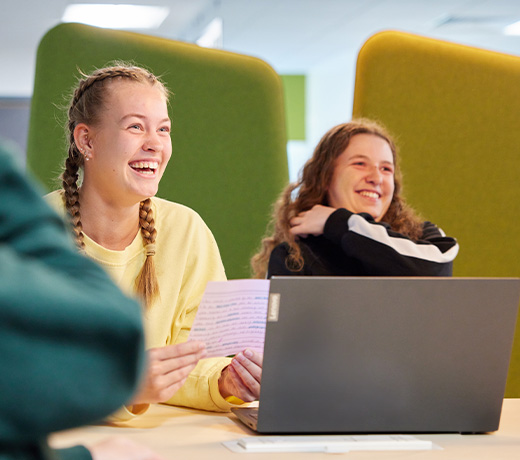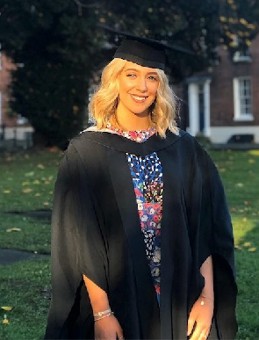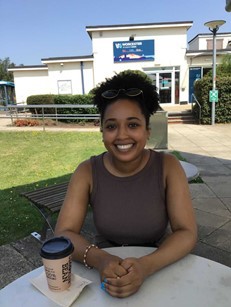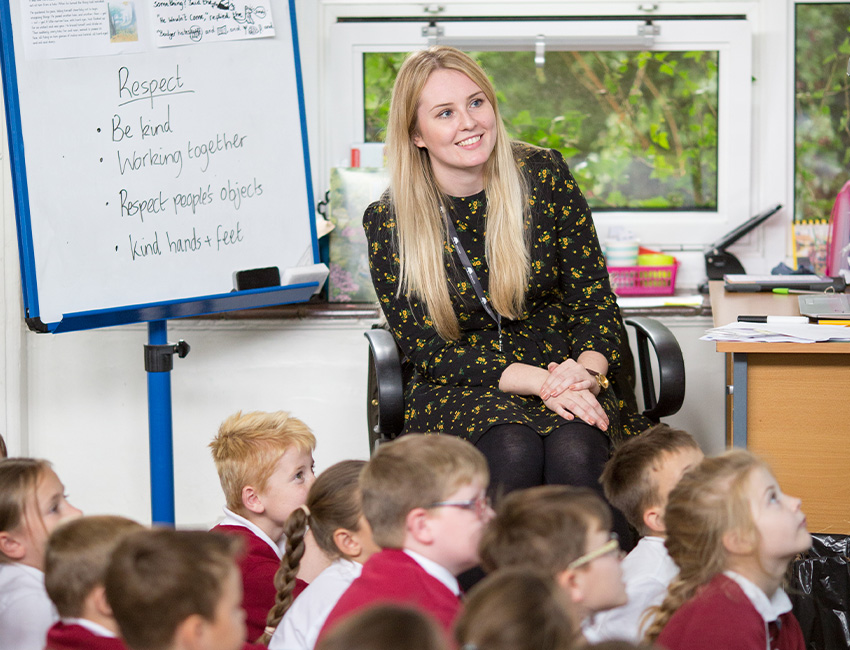Our PGCE will fully equip you to make a real difference in children’s lives through varied school placements, interactive subject sessions, and tailored tutor support.
Joint 1st in the UK for Quality Education
An exciting and inspiring place for trainee primary teachers to study
We’ve been rated as ‘Outstanding’ in training primary and secondary teachers, the highest possible grade a provider can receive.
University of the Year finalist
Recognised for our graduate success, we’re shortlisted for University of the Year in the Times Higher Education Awards 2025.
Overview
Our Ofsted Outstanding course offers you the opportunity to gain a postgraduate qualification alongside Qualified Teacher Status (QTS). With 60 credits at Masters level, the PGCE Primary can open doors to further study and other employment opportunities.
At Worcester, you’ll gain experience through multiple placements in a variety of school environments throughout the year, which will prepare you for a successful transition into teaching.
When not on placement, you’ll be taught through a mixture of lectures, workshops and interactive subject sessions covering the full spectrum of National Curriculum subjects. In these interactive sessions, our tutors will model effective teaching and classroom management strategies. Specialist facilities, such as our DT room, gymnasium, music room and art studio, are designed to replicate the school environments you’ll be teaching in, allowing you to learn in authentic settings.
There are no exams on this course. Instead, you’ll be assessed through two written assignments and a digital portfolio that you’ll complete during your school experience placements. This portfolio contains several tasks linked to the Department for Education’s Teachers’ Standards, which you must meet to qualify as a teacher.
Choose your pathway
The pathway you choose will determine the focus of your learning, on campus and on placement. You’ll choose from:
- Early Years (ages 3 to 7) – you’ll cover the Early Years Foundation Stage (EYFS) and the National Curriculum for Key Stage 1 (KS1), with school experience taking place in EYFS and KS1 settings.
- Later Years (ages 5 to 11) – you’ll cover the National Curriculum for Key Stage 1 and 2, with school experience taking place in KS1 and KS2 settings.
No matter which pathway you choose, you’ll be qualified to teach across all primary stages, giving you flexibility in your future career.
Placements
School placements are a key element of the course. You’ll spend 120 days in at least two different schools, ensuring you experience a range of key stages and environments. For example, you may be placed with a mixed-age class in a small village school and then move onto a large, culturally diverse school with multiple classes per year group.
We work hard to maintain strong relationships with over 260 schools across 25 local authorities and will organise placements for you in supportive environments. While on placement you’ll be supported by your class teacher and lead mentor, in addition to your university tutors. They will regularly observe you teach and give live feedback, so you can continually reflect on and improve your classroom practice.
Regional Training Hubs
You can apply to study a PGCE directly with the University or with one of our partner Regional Training Hubs.
These Regional Training Hubs are networks of schools working together to train teachers. When you apply through a hub you will do a mix of training at their sites and at the University, and the hub will organise your placements within their network of schools.
Upcoming events
Course details
School experience is a substantial and integral part of the course and you will have school experience visit days and block placements in terms 1, 2 and 3.
The full-time course has 36 contact weeks in total. 24 weeks will be spent in partnership schools. In addition, up to 8 days will be spent in schools focusing on specific teaching skills.
Indicative themes explored through the course content are outlined below, although regular updates mean that exact content may differ.
Careers
This course will qualify you to teach in primary schools in the UK. Most of our students quickly find jobs after graduation, thanks to the confidence they’ve gained on the course, the connections they make on placement and our excellent reputation with schools in the region.
Many of our graduates pursue leadership roles within schools, as curriculum leaders, special educational needs coordinators, key stage leaders, deputies, or head teachers.
The PGCE is an internationally recognised teaching qualification and can widen your opportunities for a career overseas. You’ll be able to seek work in countries such as America, Australia, and Canada.
The 60 credits you gain at Masters level mean our course is also an ideal springboard for those seeking further postgraduate study. These credits can be put towards a full Masters qualification, such as our multiple pathway Education MA.
"Trainees benefit from an exceptional learning experience at the University of Worcester. This experience instils in them a deep-rooted commitment to making a difference to the lives of the children and young adults in the communities they serve."
Course highlights
Teaching and assessment
The University places emphasis on enabling you to develop the independent learning capabilities that will equip you for lifelong learning and future employment, as well as academic achievement. A mixture of independent study, teaching and academic support through the personal academic tutoring system enables you to reflect on progress and build up a profile of skills, achievements and experiences that will enable you to flourish and be successful.
Teaching and assessment contents
The PGCE course enables all trainees to become autonomous learners. The course is designed to support trainees of varying experiences, needs and background; to develop key/transferable skills and to disseminate good practice in learning and teaching. To achieve this we closely monitor the quality of your experience in university and on placement.
You are taught through a combination of:
- School experience in a range of settings
- Studying all areas of learning and teaching across all EYFS and Primary National Curriculum subjects
- Tutor-led workshops, lectures, seminars and guest lectures, primarily to introduce underpinning knowledge, theoretical argument, practical skills, central issues, key texts and inter-professional fields of study
- Participation in high level professional discussion, peer presentations and debate, to encourage you to actively engage with and critically challenge the field
- Directed studies and problem-solving tasks provide opportunities to develop approaches that will deepen levels of understanding and professional judgement; development of practice-based competence and skills of critical reflection through guided individual mentoring during placements
- One-to-one academic and personal tutorial support including access to our first class Firstpoint services
In addition, there are regular opportunities throughout the year to meet with your personal tutor, where you will have the opportunity to talk about your academic progress, school experience, support with careers and applications.
Intensive Training and Practice (ITaP) are integrated within the course programme. ITaP allow you to explore granular aspects of the core content framework and focus on key skills that you will need to be effective teachers. You will be taught about the ITaP focus area, explore what this looks like in practice, engage in deliberate practice at university, before exploring the concept in school and engaging in deliberate practice within the school environment.
Graduate case studies
A few recent graduates reflect on their time on the course.
Entry requirements
Honours degree normally (2:2) or higher from a United Kingdom higher education institution or equivalent qualification. Applicants with a 3rd class degree will be considered on an individual basis.
GCSE grade C/4 in English Language or English Literature, Mathematics and Science, or equivalent qualifications. We do offer an equivalency test if you don’t have the required GCSE grade to apply for our courses.
Trainees who begin courses before providing evidence of the required GCSE standard (or equivalent) will not be eligible for financial incentives, such as bursaries or grants until they achieve the required standard.
Any questions?
If you have any questions about entry requirements, please call our Admissions Office on 01905 855111 or email admissions@worc.ac.uk.
Fees
Fees contents
UK students
The standard tuition fee for full time UK students enrolling on a PGCE in the academic year 2026/27 is £9,790 per year (subject to changes in the government tuition fee cap).
Tuition fees are reviewed annually and may increase each year for both new and continuing students.
For more details on course fees, please visit our course fees page.
International and EU students
The standard tuition fee for full time international and EU students enrolling on a PGCE in the academic year 2026/27 is £18,400 per year.
*Please note that for EU students who are not in receipt of a UK government bursary/scholarship package, the fee is £9,790 per year (subject to changes in the government tuition fee cap).
For more details on course fees, please visit our course fees page.
How to apply
How to apply contents
Applications for PGCE courses, both Primary and Secondary, should be made online through the government's Find Postgraduate Teacher Training website.
Start your application
Apply for PGCE Primary (3-7 years) (September 2026 start) - X124Apply for PGCE Primary (5-11 years) (September 2026 start) - X104Apply for PGCE Primary (3-7 years) (January 2026 start - part-time) - N363Apply for PGCE Primary (5-11 years) (January 2026 start - part-time) - D968For detailed information on how to apply for a PGCE visit Get Into Teaching.
Regional Training Hubs
You can also apply to study a University of Worcester PGCE with one of our partner Regional Training Hubs.
These hubs are networks of local schools working with us to deliver your PGCE close to where you live and teach, with training and placements organised through the hub alongside support from University of Worcester tutors. See the Regional Hubs tab for more information.
Other PGCE Primary programmes
- PGCE Primary with SENDI - B197
- PGCE Primary with PE - 3DP6
Contact
If you have any questions, please get in touch. We're here to help you every step of the way.

PGCE Primary Office
primarypgce@worc.ac.ukAdmissions Office
admissions@worc.ac.uk01905 855111More to explore
Open Days
Visiting us is the best way to get a feel for student life at the University of Worcester.

The City of Worcester
Worcester is a welcoming university city with great transport links and plenty of student parking.

Accommodation
Benefit from our accommodation guarantee. We have rooms on campus to suit every budget including en-suite options.


